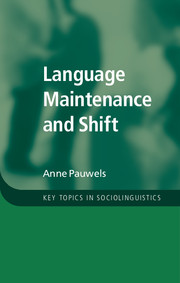Book contents
- Frontmatter
- Dedication
- Contents
- Acknowledgements
- Introduction
- PART I HISTORY, CONCEPTS, CONTEXTS AND APPROACHES
- PART II INVESTIGATING LANGUAGE MAINTENANCE AND SHIFT: COLLECTING AND ANALYSING DATA
- PART III IDENTIFYING AND UNDERSTANDING TRENDS AND PATTERNS IN THE DYNAMICS OF LANGUAGE MAINTENANCE AND SHIFT
- PART IV LANGUAGE MAINTENANCE EFFORTS AND REVERSING LANGUAGE SHIFT
- PART V FUTURE DEVELOPMENTS IN THE STUDY OF LANGUAGE MAINTENANCE AND SHIFT
- 10 Opportunities and challenges for the future study of language maintenance and shift
- References
- Index
- References
10 - Opportunities and challenges for the future study of language maintenance and shift
from PART V - FUTURE DEVELOPMENTS IN THE STUDY OF LANGUAGE MAINTENANCE AND SHIFT
Published online by Cambridge University Press: 05 August 2016
- Frontmatter
- Dedication
- Contents
- Acknowledgements
- Introduction
- PART I HISTORY, CONCEPTS, CONTEXTS AND APPROACHES
- PART II INVESTIGATING LANGUAGE MAINTENANCE AND SHIFT: COLLECTING AND ANALYSING DATA
- PART III IDENTIFYING AND UNDERSTANDING TRENDS AND PATTERNS IN THE DYNAMICS OF LANGUAGE MAINTENANCE AND SHIFT
- PART IV LANGUAGE MAINTENANCE EFFORTS AND REVERSING LANGUAGE SHIFT
- PART V FUTURE DEVELOPMENTS IN THE STUDY OF LANGUAGE MAINTENANCE AND SHIFT
- 10 Opportunities and challenges for the future study of language maintenance and shift
- References
- Index
- References
Summary
LM and LS research is now in its seventh decade since its establishment as a dedicated field of study in the 1960s. Like other fields of specialist study, the field of LM and LS has changed over time, reflecting both internal and external developments in the discipline. The preceding chapters of this book have documented the main developments that took place between the 1960s and the late twentieth century. We have shown how a variety of disciplines not only became increasingly interested in this topic of study but also contributed to it through different methodological approaches and theoretical insights: they included but were not limited to (linguistic) anthropology, social psychology of language, sociology of language and sociolinguistics. Indeed, other disciplines such as demography, political science and even economics have made contributions (e.g., Grin and Vaillancourt 1997; Ozolins 1993; Veltman 1983; amongst others). As we mentioned in Chapter 2, scholars interested in the language situation of migrant communities in the ‘new world’, primarily North America, spearheaded the development of the field. Later, its geographical range expanded to other parts of the world – Europe, South America, parts of Asia and Southern Africa – where new waves of immigrants had settled. A particularly interesting development concerned the expansion of LM studies to migrant communities in Europe. Until the 1960s Europe had in fact been the major ‘source’ region for migration to the new world. Its citizens, communities and their language practices constituted the focus of the pioneering early studies in North America and Australia, e.g., studies of Norwegians, Swedes, Dutch, Germans, Greek, Italians and Poles. In the second half of the twentieth century, Europe changed its role from being the source for to the recipient of migration, as we described in Chapter 2. The other main setting for LM and LS research is that of territorial linguistic minorities around the world. However, this setting has become increasingly the subject of a separate branch of language contact studies: language endangerment. Unfortunately, an already large and still growing number of the languages of the world's linguistic minorities find themselves in this state. In these cases urgent linguistic documentation is the primary objective to be achieved before any revitalisation or revival can be undertaken.
- Type
- Chapter
- Information
- Language Maintenance and Shift , pp. 167 - 185Publisher: Cambridge University PressPrint publication year: 2016



